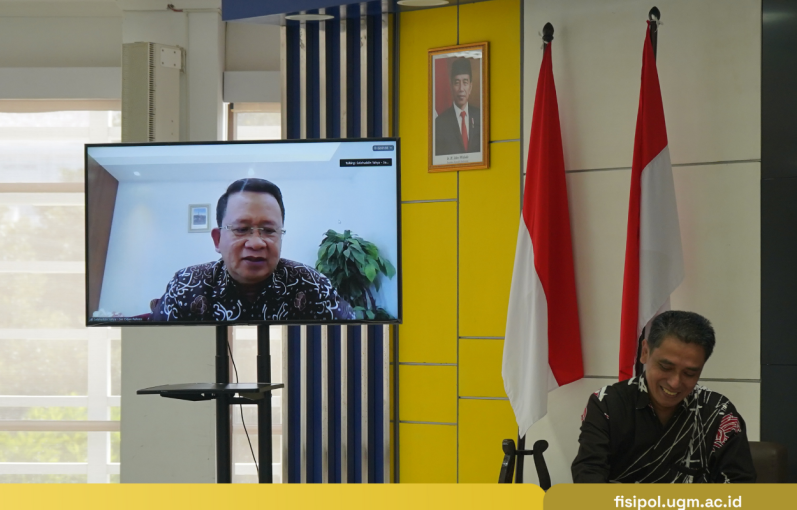
Yogyakarta, 19th of July 2024—In an effort to cool down the tensions between the practice and the concept of social rehabilitation, the Department of Social Welfare and Development of Fisipol UGM organized the 4th Graduate Symposium titled “Development of the Roadmap for Social Rehabilitation in Indonesia: Inclusivity, Sustainability and Social Independence”. The 4th symposium aims to formulate both strategies and concrete steps in improving the inclusivity, sustainability, and social independence in the social rehabilitation program in Indonesia. This event, which was done in a hybrid manner, presented Dr. Salahuddin, the Secretariat of the Directorate General of Social Rehabilitation from the Ministry of Social Affairs, as the main speaker who will discuss the roadmap for social rehabilitation in Indonesia.
Opening the discussion, Salahuddin stated the importance of developing the roadmap for social rehabilitation. The roadmap for rehabilitation covers three important aspects in the middle of leadership transition in Indonesia in the 2025-2029 period, that is inclusivity, sustainability and social independence. “The roadmap for social rehabilitation covers these three aspects, which will be a fundamental concept for model adjustment and intervention. It can also ensure that the development of social welfare in Indonesia can be executed properly,” said Salahuddin.
In the development of the roadmap for social rehabilitation, Salahuddin also underlined the importance of multi-sector collaboration, which includes the government, NGOs, as well as the people themselves. Of course, he did not forget about the role of academics in developing this roadmap. “In order for this roadmap to not stray from its original path, there needs to be contribution from the academics for benchmarking, so that social welfare can be improved,” explained Salahuddin. He also added the importance of a strong concept and theory that can adapt to the times.
But, Salahuddin depicted a reality in the field that shows the various challenges that comes with delivering the optimal service. The first challenge faced is the fact that multi-sector collaboration seems to be lacking. “Minimal coordination between the government, industries, NGOs, and the people will cause a difference in perception between the interest parties. With that, it can cause tension,” added Salahuddin.
The next challenge is the fact that Indonesia lacks both human resources and facilities. Salahuddin explained that the lack of professional human capital and high-quality facilities inhibits multi-service adaptation. Other than that, he also added that the lack of sustainability for guaranteeing the livelihoods of the recipients in the long run is a difficult challenge to solve.
In the end, Salahuddin emphasized on the importance of multi-sector collaborative efforts and the increase of professional human capital in order to develop a roadmap for social rehabilitation including rehabilitation programs like the social rehabilitation assistance program. “The roadmap for social rehabilitation will provide direction for the realization of a solid, easy-to-access, and accountable service for social rehabilitation,” closed Salahuddin.
The organizing of this symposium is both a manifestation and a shared commitment to achieve the UN’s Sustainable Development Goals, especially SDG 3 Good Health and Well-Being and SDG 10 Reduced Inequalities.
